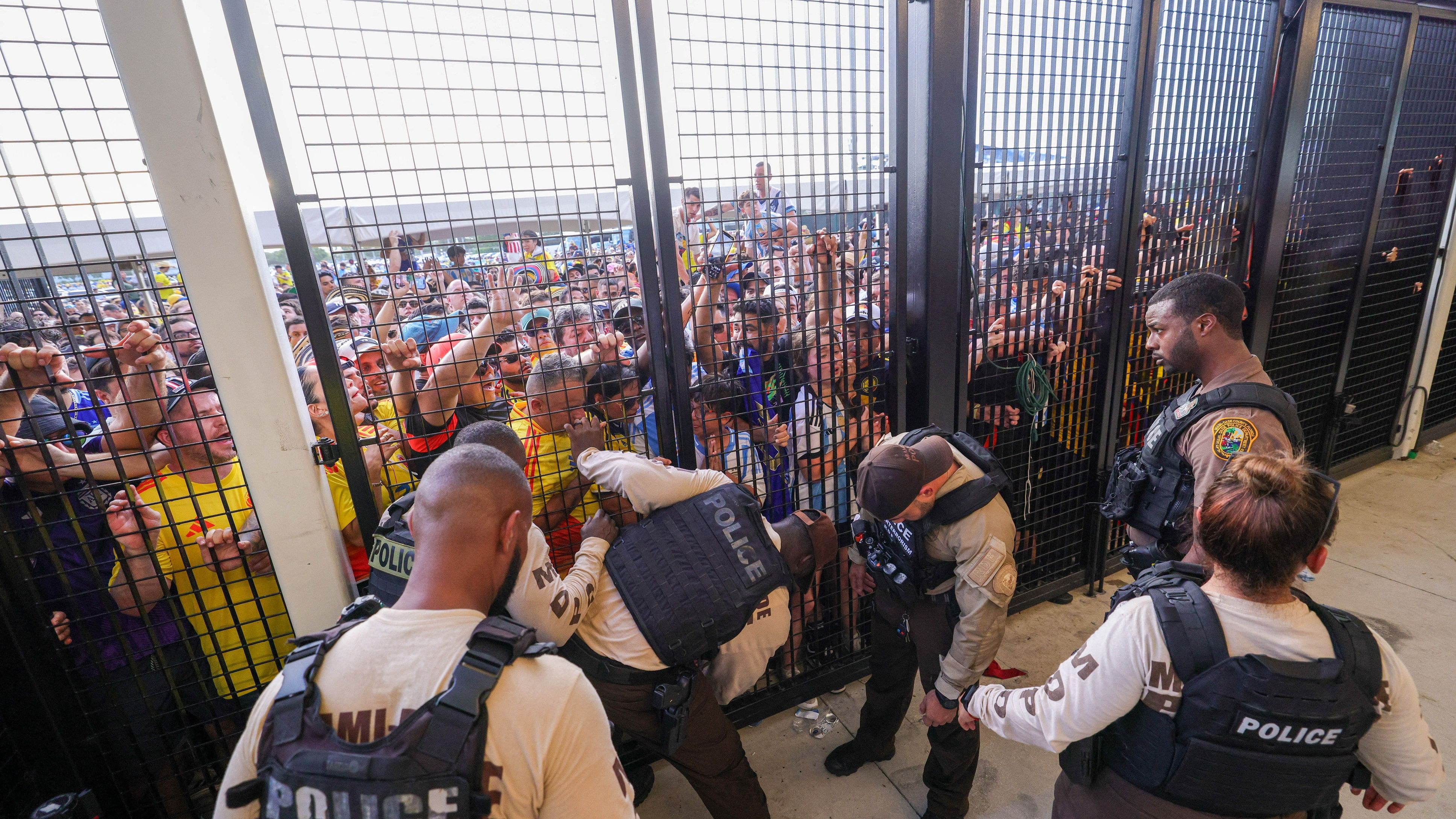
Miami Dade police monitor gates before the Copa America final between Argentina and Colombia at Hard Rock Stadium, July 14, 2024.
Credit: Reuters via USA TODAY/Nathan Ray Seebeck
By Juan Pablo Spinetto
Two hours into my attempts to enter Miami’s Hard Rock Stadium ahead of the much-awaited Copa America final between Argentina and Colombia, it was clear I was going nowhere. Frustration among fans kept growing, the law enforcement officials’ patience was running thin, and the match kick-off was fast approaching.
Every time the gates were briefly opened, a stampede of supporters — with or without tickets — forced their way through unattended scanning systems. Scenes were chaotic. With two little kids in tow, I couldn’t risk doing anything dangerous, so my wife and I decided to wait until a secure entrance was possible. That moment never came: Authorities kept the doors shut right before the start of the game, leaving us and many others outside with our overpriced tickets unused — and hearts broken.
Let’s be clear: None of this would have happened on Sunday without the thousands of ticketless vandals who went to extreme lengths to be part of the continent’s biggest football match. This condemnable and concerted thuggery would have challenged even the most seasoned promoters. Unfortunately, those in charge of organizing the final weren’t up to those standards. The result is a warning sign that US stadiums and cities should take seriously as the country prepares to host the World Cup together with Mexico and Canada in 2026. It’s also a reminder of how much South American football has to improve if it wants to play in the major leagues of global sports entertainment.
It’s easy to see why US authorities underestimated the potential risks surrounding this game: In the heat of the moment, one official shouted at us from the other side of the fence: “This never happened here before,” making the point that the chaos was the product of barbaric behavior by South American fans. Forget for a moment his casual racism: The official ignored — as probably did his bosses — what big football matches mean to many mortals regardless of their nationalities or class status. If you don’t believe me, just watch Netflix’s The Final: Attack on Wembley, which describes the dramatic events surrounding the 2020 Euro final in London.
But unlike that horrific case, the Copa America disaster was preventable. For a start, authorities should have established different security perimeters to identify troublemakers way before they approached the stadium, as is customary in these matches. There are reasons to believe this was a request by South America’s football governing body Conmebol that authorities for some reason ignored (they only forced fans to show their tickets if they were entering to the parking lots, prompting the bad guys simply to park their cars outside and walk freely to the gates).
The number of security officers mobilized was also inadequate: Just over 800 for a game attended by 65,000 people. By comparison, when I attended an Argentina-Uruguay World Cup qualifier in Buenos Aires in November, I crossed two checkpoints before getting to the stadium’s entrance and the event was guarded by 1,100 officials plus support staff for a crowd of about 55,000 (and still some ticket holders were left out that night). Despite their self-praise, the Miami police didn’t seem very effective either: During the final, they arrested 27 people and ejected another 55. If we conservatively assume a thousand people entered illegally, that means 9 out of 10 were left uncaught — tempting odds for these crooks to try to repeat the feat.
In a way, Sunday’s events are a consequence of two very different cultures colliding: Conmebol’s transgressive, revenue-focused and always opaque decision-making style mixed with the arrogant, we-know-better attitude of the stadium and local authorities. That dysfunctional combination echoes the difficulties that Latin American policymakers and their US counterparts sometimes have in understanding one another. It guarantees there won’t be another Copa America in the US for the foreseeable future.
As the owner and day-to-day runner of the tournament, Conmebol certainly bears most of the responsibility. From the beginning, it tried to divert blame onto others and still hasn’t apologized to the fans who couldn’t use their tickets — nor shown any intention to compensate them. The arrest of Colombia football federation’s president and Conmebol official for allegedly assaulting stadium staff was the icing on the cake.
But American cities and stadiums are kidding themselves if they think they can prepare for football — excuse me, “soccer” — like any other big event, as Miami did. In fact, fan violence is sadly a trend happening around the globe, including the US. And Copa America witnessed other security failures, such as fistfights between Uruguayan players and Colombian fans at the stands during a semifinal. It’s true FIFA will oversee things in 2026. That means much tighter security, as we saw in the last two editions in Qatar and Russia. If there is a positive aspect to all this, it’s the chance that authorities now have to learn from mistakes and prepare for the biggest and most complex World Cup ever.
For my part, I still resent the Colombian dude next to me gloating about not having a ticket when he was trying to crash a gate. Having ingenuously paid almost $4,400 for my family’s four tickets, I could perhaps be forgiven for thinking how unfair the whole experience was. But worst of all was missing our long-held dream of witnessing Lionel Messi lifting another cup for Argentina. No refund will ever compensate for that.